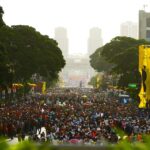
By Eduardo Viloria Daboín
I
Venezuela died suddenly. There was, suddenly, a great silence all over the country. The whatsapp chats were silent. The elevators stopped. The refrigerators stopped cooling. The subway stopped. The fans stopped blowing. The only computers that remained on were the laptops while their battery lasted. Service stations did not continue pumping gasoline. Only a few television stations and radios continued to broadcast. The electronic payment devices did not process more payments. The incubators stopped sustaining newborns. The operating rooms were dark. Life support and intensive care units ceased to be until power plants started up. In short, a hard blow, total and simultaneous, to the whole country. It was as if they suddenly unplug the country. Well no more. They lowered the switch and that was it. Everything that works with electricity went out but People were turned on.
It would have been like being in a vacuum, without a floor. Despair and violence could have generalized if it were not for the absence of electricity, especially since it was prolonged, implied to be left without a filter and face to face in the depths, the fundamental, the basic. And that is what happened. What was vital pushed by itself. The need for communication and information increased and lengthened the corridor, staircase and alley talks. Streets usually solitary remained populated until late. There were bonfires at the corners, not to save but to illuminate pedestrian traffic, take care of the street or accompany the game of domino seasoned with dried cocuy, rum without ice or hot beer. If the food was in danger of being damaged, the option was to gather things among neighbors, relatives, acquaintances, and cook in a collective way.
Although the US pawn in the plan of attack against Venezuela incited via twitter to looting and violence, he did not succeed. There were some outbreaks, in Maracaibo it was serious. In Pedraza, Barinas, a group of vandals set fire to the town hall, looted Pdval, a Chinese grocery store related to the government, as well as an attempted armed assault on a Caribbean Battalion. The headquarters of the municipality of Páez from Apure State was also attacked by armed men who tried to set it on fire. However, the violence was focused, it was not generalized throughout the country despite the political and media forces that operated to make it so.
The chaos did not ignite, violence did not break out. The people, focused on living, getting water, not letting food to spoil, deciding how to liquefy a cream of rice or potatoes for the 8-month-old baby, we did not think about violence even remotely. Such are wars: a tremendous force pushes towards death while generating another equally tremendous force that fights for life and clings to what it implies.
II
They removed Maduro from office. The gringos arrived. The military rose up. As the hours passed, the hypotheses began to run from mouth to mouth. The uncertainty had to be filled with something. In the interior of the country, especially in the West, regular daily cuts are programmed by rationing and failures are also regular, which can last for hours.
But in Caracas, that is not usual. For those who experienced the blackout in Caracas, two continuous hours without electricity is extremely unusual. So a couple of hours were enough to start the alarmist conversations, pointing to the most serious as possible explanation. After the phone message of Mota Domínguez was heard: there was an attack against Guri, the backbone of electricity in the country. Those were his words.
Again the tale of sabotage? Can anyone doubt that it was the gringos? Between each option, each one quickly took a side. Meanwhile, Radio Bemba (mouth to mouth) was working at full speed: it was known that the blackout was national, 17, 18, 20 states. And it was also known that it was serious, unlike any other lived in the country before. There is always someone who has a radio battery and still had charge for cell phones that captured FM signal. What the radio said spread from window to window, from corridor to corridor, from building to building, from house to house, from street to street.
III
“There in Guanare all the people went to the river. There were more people than at the carnival. Everyone, poor and rich, went there. Everyone, except some politicians, side by side, who went to the five stars hotel and settled there. Can not you see that they have a plant there? But in general it was a bacilón (party). Even the escualidos helped. There was one that put a truck to load water into a tank and distribute it in the communities. And what is that escualido (right winger)? They even joke around. We chavistas put a red beret on him and tried to take videos with phones, but he did not let us. And in the river there were all the opposition people: “Greetings, comrade, we the Chavistas told them. Your death will be avenged, the escualidos responded” (communist joke). Another good thing was that everyone who had some meat in the house took it out to roast it. There were grills everywhere, in the streets, in the squares, in the river. I believe that we have taken so many punches here that we have learned a lot. And we continue learning. For example, now people there are buying salt, a lot. For what? Well, because if there is another situation like that or worse, with salt you can preserve the meat and that lasts a lot”.
RELATED CONTENT: Ten Micro Chronicles of Resistance in the Middle of the Blackout
IV
In a middle class neighborhoods of Caracas, a neighbor’s car that has a 110V current converter that plugs into the cigarette lighter became the most popular car in the block. Everyone charged their cell phone, Ipads, tablets. Liquors, rice creams, tomatoes were liquefied to make sauce and stored in bottles. People came down with their blender charged and waited their turn. The car owner had to leave, he went on his motorcycle and left the car there, with the key and everything, in the charge of the people who used the converter. “This car is expropriated, now it’s the people’s”, they told him jokingly when he went to warn that he had to leave. They looked after the car and were waiting to turn it on every now and then so that the battery would not be discharged. In that same street, when the light came back, it did not reach the whole block. In one building an extension was thrown to another that did have (power), and in which there was no light, a single refrigerator was plugged in and everyone kept food there that was at risk of being damaged.
V
In the commune of Altos de Lídice a couple of young leaders took the initiative to organize a sports tournament for the children of the neighborhood. That was on Saturday, after understanding that doing it would be a huge help to the fathers and mothers who were super busy looking for water, solving the issue of the empty gas bottle, anguished by the absence of telephony, without much desire for the arrival of the night again without light. With all those problems and the boys and girls without school, we had to do something to help, that’s what they thought. The Leon Trujillo school’s court ended up being a hotbed of children playing soccer and basketball all weekend.
VI
A comunero from the municipality of San Francisco de Maracaibo, Zulia State, and a journalist, say that there was violence, looting, vandalism. In social networks, photos and videos circulated. The previous day, men on motorcycles passed threatening to break windows, burn everything. Some merchants took the merchandise that night and put it under guard. The threat was fulfilled.
They looted butcher shops, clothing stores, liquor stores, shopping centers. Not only did they take merchandise, they destroyed the facilities and took away equipment: cash registers, weights, slicers. People were summoned with the lure that they were going to distribute free food to have people who ransacked after the premises were violated. Groups of organized chavistas confronted the looters, made an effort to impose order. The police acted as well. There were 200 arrested. They also attacked the Pdval distribution center in a parish. The people of the commune avoided the looting and decided to distribute in an organized way the food that there was among the dining rooms of the parish. The comunero reports that during the looting an armed man remained on a rooftop talking all the time on the radio. Was he directing an operation of organized violence?
VII
14 days from the blackout everything is calm, normal, in this strange Venezuelan normality. To take stock of what happened implies saying with conviction that in the Venezuelan people there is a lack of joy, good humor, solidarity. And we must give the right place to the importance and strength of the fabric of the people’s organization that is the backbone of the country, the result of the Bolivarian revolution and the political and pedagogical work of Hugo Chávez.
After years of war and political and economic crisis, after at least two decades of a permanent media bombardment sowing hatred, the need for violence, intolerance; after a fierce campaign in recent months in favor of war, the road to war does not curdle between us. Once again it has been demonstrated and this time it was not a small thing.
That in the intense climate of social tension that exists in Venezuela since the attempted coup d’etat started and the frontal aggression of the US government, during the blackout calm and solidarity prevailed, it is a profound signal of what it is sown in the substrate of our society. It is key to keep working on that substrate, that positive stuff that our people have inside. It is key to nurture and organize that happy and supportive clay that we are, especially to face the consequences that the economic crisis and the blockade generate in the most vulnerable, to face them from that logic, which is contrary to competition, individualism and exploitation. of the human needs that characterize capitalism.
The aggression will not cease. The United States will continue to deepen the siege of Venezuela. In its strategy, it is central to take the Venezuelan people to the limit to exploit suffering and discontent in favor of interventionism and interference. The usual opposing social base is not enough for that.
In addition to a radical economic transformation of the country to overcome the serious dependencies of our economy, it is fundamental to deepen the spaces of grassroot protagonism and to stimulate to the maximum the creation of networks and forms of popular solidarity. We have the solid base for this and in society are the vertebrae, the muscles, the viscera for that purpose. The coordinates to continue resisting, sustaining peace and building the future are there.
Source URL: 15 y Ultimo
Translated by JRE/EF
| Website





